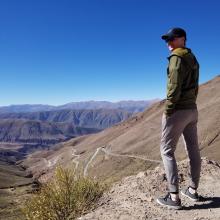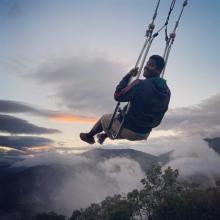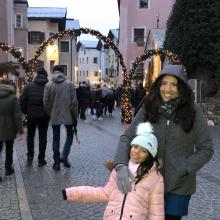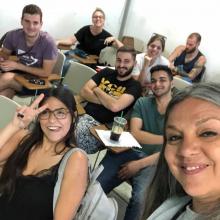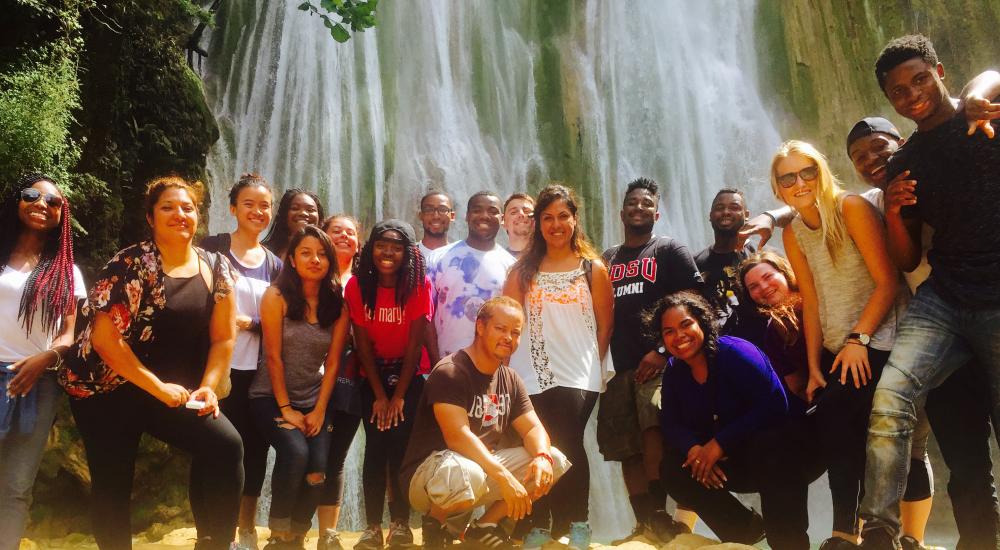Blazing a New Trail
For some people, the path to higher education—and to study abroad—is not always a straight line. But education abroad is not an unattainable goal for those who set their sights on living and learning in another country. International Educator spoke to six students about their nontraditional paths to education abroad. Some went abroad as community college students, less than 1 percent of whom participate in education abroad. Others began or resumed their education after a significant break to raise children or to work, or as student-parents who had to make the difficult decision to leave their young children for several months. Many are the first in their families to go to college or leave the country.
A recurring theme among the students was that they consider study abroad more than just a fun opportunity to travel to another country. The experience was a transformative one that prompted career changes and inspired those around them.
Malika K. McCoy, who spent the summer of 2019 in Scotland as a student at the Community College of Baltimore County, says the experience was about showing her family, especially her daughter, what is possible.
“I want to have a great career, but it’s also about breaking barriers for my family, allowing them to see that you can get through obstacles, whether it’s poverty or dropping out of high school,” says McCoy, who has since transferred to the University of Baltimore. “You have those statistics that are weighing against you. You’re less likely to go to school because your parent was a teen mom. And so, for me, it’s really about breaking those generational barriers.”
Feeling Truly Free
Morgan Godvin, Portland State University (Oregon)
Expected graduation: Summer 2021
Study abroad destination and term: Argentina and Uruguay, summer 2019
Majors: Public health and Spanish
Morgan Godvin enrolled at Portland State University in January 2018, one week after she was released from federal prison. While serving a 5-year sentence on a drug-related conviction, she was incarcerated with many women from Mexico and other Spanish-speaking countries.
“I had taken 2 years of Spanish previously, and so I decided that I was going to use this experience to learn more Spanish,” she says. “I ordered the 501 verb conjugation book and a Spanish dictionary, and I learned Spanish without Google translate. There were many times my cellmates did not speak English and I was forced to speak Spanish 100 percent of the time.”
That experience prompted Godvin to think about her plans after she was released from prison. Though she wanted to study abroad and travel, she also expected 5 years of supervision once she got out of prison. “I knew that I probably wouldn’t be allowed to leave the country for 5 years,” says Godvin.
At Portland State, she enrolled in upper-division Spanish classes and saw a flyer about studying abroad. She connected with the study abroad office and found out about the Benjamin A. Gilman International Scholarship Program, a competitive scholarship for Pell Grant-eligible students. She completed the application and an essay, submitted them, and “totally forgot about it,” she says.
“I had won a $5,000 scholarship to study abroad, and at that time I was still on house arrest and I had a GPS monitor on my right ankle.” —Morgan Godvin
A few months later, Godvin received an email congratulating her on winning the scholarship. “I had won a $5,000 scholarship to study abroad, and at that time I was still on house arrest and I had a GPS monitor on my right ankle,” she says.
Godvin was worried she would be ineligible for a passport because of her federal drug conviction. She reached out to U.S. Senator Ron Wyden’s office, which connected her with a State Department liaison. “They said go ahead and apply for your passport,” she says. “It showed up in the mail 10 days later.”
She also had to receive permission from a federal magistrate judge to be allowed to travel abroad. “I was super nervous up until the last minute that they weren’t going to let me go,” she says. “And then finally I got the confirmation that this judge had approved it and I would be going abroad.”
Godvin says that landing in South America was the first time she had felt truly free in almost a decade. “People were not judging me based on my criminal history,” she says. “I was just who I was at that moment.”
Her study abroad program was a Spanish immersion program focused on public health. She spent 4 weeks in Buenos Aires, Argentina, and 3 weeks in Montevideo, Uruguay. While in Uruguay, Godvin researched the country’s drug policies, such as federally legalized cannabis and state-funded drug treatment services. In Argentina, she interned with an international human rights nongovernmental organization where she says she felt her “experiences were being valued.”
Though returning home was difficult—“I couldn’t leave the state [of Oregon] without written permission,” she says—Godvin was released from supervision 3 years early and will be graduating from Portland State this summer.
She says her experience abroad showed her two sides of the U.S. government. “The State Department gave me this amazing scholarship, and then, a couple months later, the same federal government is treating me so differently,” she says.
Godvin encourages other formerly incarcerated students to consider study abroad. Some countries will not admit international travelers with convictions, but there are many that will. There are commonly held misconceptions that people with criminal records are not eligible for Pell Grants, passports, or federal government-funded scholarships. While there may be additional layers of bureaucracy to surmount, she wants students to know it is possible.
“People with felonies are deterred from ever applying to these programs because they assume they aren’t eligible,” she says. “My photo album is proof that we are.”
Coming Full Circle
Quran Howard, Miami Dade College
Graduated: December 2020
Study abroad destination and term: Ecuador, summer 2019
Major: Political science
Quran Howard’s favorite memory from his summer study abroad program in Ecuador is not a visit to a national landmark or a lazy day on a pristine beach. It involves doing laundry.
While his classmates were taking a tour, Howard had stayed behind to wash his clothes. He did not speak Spanish, but he asked the woman at the hotel where he was staying for help. “Somehow, we communicated, and she helped me hand wash and dry my clothes,” he says. “I thought that was the sweetest and most amazing thing ever.”
Howard had always been fascinated by other countries and cultures, but he had not thought about studying abroad as a student at Miami Dade College in Florida. He was visiting his adviser at Educate Tomorrow, a nonprofit organization based at Miami Dade that supports foster youth and homeless students, when she asked him if he wanted to study abroad. “I was just eating a sandwich, and I was like, ‘What? What are you talking about?’”
Thirty minutes later, Howard was filling out an application and recording a video. Six months later, he was getting on a plane to Ecuador—his first time leaving the United States. He enrolled in a 2-week course focused on ecology and sustainability that took him to Quito, the Galápagos Islands, and the Ecuadorian rainforest.
Howard’s journey to Ecuador started several years ago with his path through higher education. He was a strong student in high school and enrolled at Howard University, a historically Black university in Washington, DC—the first person in his family to go to college. He dropped out after his first semester and then spent 3 years working at Amazon.
When he left Howard, he felt like he was letting people down. He eventually moved to Florida, where his aunt and brother lived. “I came down here to start over,” he says.
Study abroad was an opportunity that Howard never expected when he went back to college. “If you would have told me that I would experience all the things that I would experience in these 2 years since I came to Miami Dade, I would have been like, ‘You’re lying,’” he says. “It was crazy how many things that I let myself open up to.”
Howard is currently serving as an AmeriCorps VISTA at Miami Dade. His experience in Ecuador inspired him to continue his service abroad. “I think it really solidified me wanting to do the Peace Corps,” he says. “It gave me the hope of being a global citizen and a person who has a legacy outside the borders of the country where I was born.”
“[Studying abroad] solidified me wanting to do the Peace Corps. It gave me the hope of being a global citizen and a person who has a legacy outside the borders of the country where I was born.” —Quran Howard
Howard graduated from Miami Dade in December 2020 with an associate’s degree in political science. He received a scholarship to return to Howard University this summer, and he has also applied for a Gilman scholarship to study Bengali in India. He sees it as coming full circle.
“I thought of college as being the end,” he says. “But now I know college is only the beginning. And I think [Miami Dade College] has really trained me how to be a college student and adult. And going back to Howard and finishing what I started is something [that is] super important to me.”
Breaking Generational Barriers
Malika K. McCoy, Community College of Baltimore County (now enrolled at University of Baltimore)
Expected graduation: May 2022
Study abroad destination and term: Scotland, summer 2019
Major: International business
When Malika K. McCoy traveled to Scotland for a study abroad program at the University of Stirling in summer 2019, she had to spend 6 weeks away from her 11-year-old daughter, Kalea. “We did a lot of video calling,” McCoy says. “I’m really grateful for the technology that exists today that makes it really easy to communicate with people no matter where you are.”
Her family was surprised, but supportive, when she told them she wanted to study overseas. “I don’t think anyone would have ever said, ‘Malika’s going to go abroad and study,’” she says.
McCoy’s story is one of firsts. She had dropped out of high school and had her daughter while she was still a teenager. When she enrolled at Community College of Baltimore County (CCBC) in 2018, she was the first member of her family to attend college. “I’ll be the first person to graduate,” she says. “And I was also the first person in my family to leave the United States.”
McCoy says that Scottish culture was different from U.S. culture, but it was familiar enough that she felt comfortable engaging with the people she met there. One of the highlights of her summer program was hiking to the top of Mount Dumyat, located near the university campus, and having a group of new friends sing “Happy Birthday” to her.
For McCoy, studying abroad was about more than experiencing another country or boosting her résumé. It was also about showing her family, especially her daughter, what is possible.
“I want to have a great career, but it’s also about breaking barriers for my family, allowing them to see that you can get through obstacles, whether it’s poverty or dropping out of high school,” she says. “You have those statistics that are weighing against you. You’re less likely to go to school because your parent was a teen mom. And so, for me, it’s really about breaking those generational barriers.”
“You have those statistics that are weighing against you. You’re less likely to go to school because your parent was a teen mom. And so, for me, it’s really about breaking those generational barriers.” —Malika K. McCoy
Since McCoy studied abroad, her own mother has gone back to school, and her sister is earning her GED. “For me, [I gained] all the benefits of studying abroad that are already there for any student, but then magnified by my personal story and the benefits that it has, like inspiring my family members to go for something that’s risky.”
Her time in Scotland, which was funded with the Gilman scholarship, also prompted her to change her major from English to international business. “My study abroad actually inspired me to want to work internationally,” she says.
McCoy finished her associate’s at CCBC and transferred to the University of Baltimore in fall 2020. Now she’s looking into master’s programs abroad. Her experience has piqued McCoy’s daughter’s interest in other countries. “I want to study in another country, too, and because of my mom I know that it can be easy,” says Kalea, who is now 12.
Kalea is studying Japanese and wants to study in Japan someday “so I can learn to be a better manga artist,” she says.
Gaining a Sense of Strength
Kristabelle Mendoza, University of New Orleans
Graduated: Spring 2018
Study abroad destination and term: Austria, spring 2017
Major: Civil engineering
A semester-long study abroad in Innsbruck, Austria, in 2017 was not the first time that Kristabelle Mendoza had moved to another country. In 2005, at the age of 9, she moved to New Orleans from Honduras with her mom and sister just weeks before Hurricane Katrina hit the southern United States.
“It was really tough at the beginning, because we came here to have a better life,” she says. “And instead, it was just this confusion of ‘What’s happening to the world?’ because our city was flooded.”
Mendoza’s family evacuated to Houston, and it was several months before she was able to enroll in school. “I had a rough time adapting at the beginning because I missed my home so much,” she says. “But I was old enough to understand why we came here. I just had to grow up really fast.”
Once she learned English, she excelled in school and soon discovered a love of math and science, which led her to major in civil engineering at the University of New Orleans (UNO). But she also enjoyed languages and started studying French.
After hearing about a fellow civil engineering student’s study and research abroad experience in Austria, Mendoza learned about funding for STEM students at her university to do research abroad at the University of Innsbruck through the Austrian Marshall Plan Foundation. “My dream has always been to go to Europe, because I’ve always been interested in European languages,” she says. “I speak Spanish, and then I was taking French classes. But I had never considered German.”
Mendoza wrote a statement of purpose and found out in January 2017 that she would be spending the spring semester in Austria. She had to take an online engineering class to keep her institutional financial aid at UNO, and she also took German language classes, a German phonetics class, and an Austrian history class. In addition, she worked on a research project on geotechnical engineering.
The most difficult part of studying abroad was leaving her daughter, who was 4 at the time. Before she committed to the program, Mendoza discussed it with her daughter’s father. “He and I are not together, but he’s been supportive of her since she was born,” she says. “He knew that this was my dream. And he’s like, ‘Yes, of course, we’ll all help here to take care of her while you’re gone.”
Mendoza says that without the support of her family and her daughter’s father, she would not have been confident enough to study abroad. “It was so bittersweet, and my daughter to this day, she still remembers when I left for 6 months,” she says.
“I had to figure it out on my own. And it gave me the sense of strength and that I could really succeed anywhere in the world.” —Kristabelle Mendoza
Her journey to Austria was eventful—but worth it. Because of complications with getting a student visa, she was rerouted from Frankfurt to London before flying to Austria the next day. “When I arrived in that airport, in the heart of the Alps, it was all worth it. I had never even been to snow before this trip. And I was arriving in February in the middle of these powdery mountains. It was just incredibly dreamy.”
Mendoza says that studying abroad was good for her career since science is a global field. After graduating in 2018, she now works as a structural engineer designing bridges. She has continued to take German classes, and her daughter, who is now 8, is also learning. “When she goes up to people, she’s very enthusiastic about telling them what she knows in German,” Mendoza says. “She also speaks English and Spanish, so she’s on her way to being trilingual right now.”
The program was also an opportunity to gain independence. “I was able to detach from my family,” she says. “It was the first time I lived alone for such a long period of time. That developed me into someone who is even more independent, who can really see the world for what it is, and not for the way that my family sees it. I had to figure it out on my own. And it gave me the sense of strength and that I could really succeed anywhere in the world.”
Opening New Doors
Shawn Woodhouse, Lebanon Valley College
Expected graduation: Spring 2021
Study abroad destination: Northern Ireland, spring 2020
Major: Audio and music production
Shawn Woodhouse already had a successful career in music production when he decided to go back to school to earn a bachelor’s degree in audio and music production from Lebanon Valley College (LVC), a private institution in Pennsylvania. He initially enrolled at LVC in 2015 but paused his studies due to medical issues that led to multiple heart surgeries. He returned to LVC briefly until he got sick again and lost one of his legs due to a hospital mishap during an operation.
“I healed up from that, went back to school for a semester,” he says. “Then the opportunity came up as part of my program to go study abroad, and I was pretty determined that my life has to go on after all these hiccups. It was a great opportunity to go study at probably one of the best sound labs in the world at Queens University Belfast.”
Woodhouse was able to use his grants and scholarships from LVC to pay for the program. “It really made no sense to me why not to do it,” he says. “I was going to end up paying the same price going overseas as I do staying 10 minutes from the school.”
When he arrived in Northern Ireland, he got involved with local music organizations, singing with the Belfast Philharmonic and the Belfast Operatic Company. Like thousands of U.S. students studying abroad in spring 2020, he had to return home as COVID-19 began to spread in March and continue his classes online.
“It really made no sense to me why not to do it. I was going to end up paying the same price going overseas as I do staying 10 minutes from the school.” —Shawn Woodhouse
Woodhouse, who will graduate from LVC in 2021, says that the highlight of his time abroad in Belfast was diving into a new culture. He liked the tighter focus that degree programs in Northern Ireland, which are often 3 years, have on the discipline.
He says he learned a lot about sound design, an area of audio and music production in which he had not previously worked. “It offers me the opportunity to have doors opened for me that wouldn’t have been open before,” he says.
Woodhouse also says he might have gotten more out of his study abroad experience as a nontraditional student. “I think just because I’m older, I understand how to move ahead a little bit,” he says. “Some [younger students] don’t understand that they have to ask questions if they want certain things to happen. When I was 21 years old, I didn’t ask those questions either. It’s a little bit of a different experience.”
Getting “Global Wings”
Penny Belcourt, Texas Woman’s University
Graduation: May 2019
Study abroad destination and term: Greece, summer 2018
Major: Business management
“I am kind of a needle in the haystack,” says Penny Belcourt, a 2019 graduate of Texas Woman’s University (TWU). “I am a Native American woman. I am a nontraditional student. I’m kind of doing my life backwards.”
Belcourt is an enrolled member of the Chippewa Cree Tribe. Her mother’s family is originally from the Rocky Boy’s Indian Reservation in Montana. “I’m the first generation born off the reservation,” she says.
Belcourt dropped out of high school in the ninth grade. At age 18, she got married, had a son, and earned her GED. She spent the next 30 years running her own beauty salon. In 2004, her stepdaughter died in a tragic car accident, which served as a wake-up call for Belcourt.
“She was 17 and [had] her whole life in front of her,” says Belcourt. “And then one day I woke up [and realized] she never got to see all these things. There are so many things I’ve seen in books and on TV, and I never got to see any of these things. I thought, ‘There has to be more to my life than this little beauty shop in Texas.’ So I shut my shop down and started attending junior college.”
Belcourt finished her associate’s degree and thought she was done with her education. Then she met a recruiter from TWU who encouraged her to apply to earn her bachelor’s degree. In 2017, Belcourt applied and was awarded a full-ride transfer scholarship, which included a $5,000 stipend for study abroad. She began to work with the education abroad office to find the right program.
“There are so many things I’ve seen in books and on TV, and I never got to see any of these things. I thought, ‘There has to be more to my life than this little beauty shop in Texas.’ So I shut my shop down and started attending junior college.” —Penny Belcourt
“I narrowed it down,” she says. “I like sunny, I like beautiful, and I like beaches.” Greece met those criteria and was also the most affordable of her options.
Belcourt spent 2 months at the American College of Greece in Athens, where she had to learn to navigate the city on her own. “I had to find my own way and jump on the train,” she says. “I’m from Fort Worth, Texas, darling—we don’t have trains. We don’t do public transportation. The amazing part was how quickly I acclimated.”
On the first day in one of her classes, a student asked how many classes they were allowed to miss before it affected their grades. Some of her younger peers were more interested in partying and dating than learning about Greek culture. “I was there to experience the country and the people, and I wanted to travel,” she says.
She initially felt isolated and wanted to come home after a few weeks. Then she started to get to know her Greek classmates and other people in the community. “It usually doesn’t take me very long to make friends,” she says. “All of a sudden I immersed myself in Greece with Greek people.”
One of her goals was to understand the cultural differences between Greece and the United States. “It was really huge to me to understand the differences—from my home to their home,” Belcourt says. “And more importantly, when you take the time to understand a different culture, they embrace you.”
She also did not hesitate to share her perspective on her own country. “There were a lot of times I could step up and say, ‘No, that’s not quite true. That’s not really how it works,’” she says.
Belcourt graduated in June 2019 and is currently pursuing an MBA at TWU. The pandemic interrupted her plans to do a second study abroad program in Greece with her graduate program, but she has kept busy running the Apache Warrior Foundation, a nonprofit she founded with her husband, a 25-year military veteran and former Apache helicopter pilot.
At age 53, Belcourt says her educational journey is not over yet. “I’m a good halfway through it,” she says. “And I thought I never could. I never got out of the ninth grade. I never wrote a paper in high school. Didn’t have a prom. Didn’t have graduation. Didn’t have any of those things. And those were all barriers that [made me think] I couldn’t do this.”
None of what Belcourt has achieved would have been possible without support along the way, she says. “With my journey in school, [it is] the same way with this study abroad journey. If you look, there’s always support,” she says. “When I didn’t know how to write a paper, I went and found the writing lab. When I was struggling with math—and oh, Lord, I struggled with math—there was the math lab. When I struggled with studying abroad, there was the study abroad office to lean on.”
“I have seen things in the world that I never thought I would see. All the things I’ve seen in history books—I’ve actually been there,” says Belcourt. “And it’s because of having my global wings, to not be scared to know that I can go anywhere.” •
About International Educator
International Educator is NAFSA’s flagship publication and has been published continually since 1990. As a record of the association and the field of international education, IE includes articles on a variety of topics, trends, and issues facing NAFSA members and their work.
From in-depth features to interviews with thought leaders and columns tailored to NAFSA’s knowledge communities, IE provides must-read context and analysis to those working around the globe to advance international education and exchange.
About NAFSA
NAFSA: Association of International Educators is the world's largest nonprofit association dedicated to international education and exchange. NAFSA serves the needs of more than 10,000 members and international educators worldwide at more than 3,500 institutions, in over 150 countries.
NAFSA membership provides you with unmatched access to best-in-class programs, critical updates, and resources to professionalize your practice. Members gain unrivaled opportunities to partner with experienced international education leaders.



